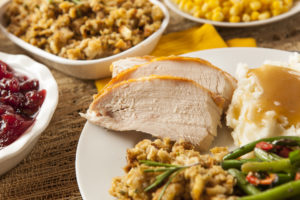Are You Allergic to Turkey on Thanksgiving?

We have all felt it and we have all heard it. “Turkey on Thanksgiving makes you sleepy!” If so, is it an allergy to turkey that causes this sleepiness? Is it just a side effect of something in the turkey that causes this tiredness and lethargy? Some have blamed the high amounts of the essential amino acid L-tryptophan for the somnolence. Regardless of what you have heard, the fact is that turkey does not cause sleepiness. Why then do people tend to feel sleepier on Thanksgiving?
Let’s begin with the fact that there are high amounts of the essential amino acid L-tryptophan in turkey. But what is L-tryptophan? L-tryptophan is an essential amino acid that must be acquired from foods we eat since the body does not produce L-tryptophan on its own. Amino acids are the precursors to proteins. It takes multiple amino acids to make a protein. Thus, amino acids are considered the “building blocks” of proteins. It is also important to note that there are a variety of other foods besides turkey that are rich in L-tryptophan. Some of these foods include fish, canned tuna, eggs, legumes (e.g., peanuts, lima beans, soybeans), milk, yogurt, seeds (e.g., sesame, sunflower, pumpkin), oats, cheese, chocolate, bread, and some fruits. It should be noted that turkey and chicken both have similar amounts of L-tryptophan. Another interesting fact is that the white turkey meat has more L-tryptophan than the dark turkey meat, but with chicken, it is the reverse, as there is more L-tryptophan in dark chicken meat than white chicken meat.
L-tryptophan is needed for the body to produce serotonin, a chemical in the brain that plays a role in one’s mood, as well as one’s pain intolerance. When serotonin levels are high, one’s mood is elevated and a sense of relaxation ensues. In addition, one may also have a higher pain tolerance. Thus, L-tryptophan is thought to have a beneficial effect on memory, learning, mood, and depression. It may also have beneficial effects on reducing anxiety, seasonal affective disorder, and premenstrual pain although more research is needed to confirm this.
Many people often experience sleepiness and fatigue after eating a Thanksgiving Day meal. Many attribute this lethargy to the turkey eaten on Thanksgiving. Many feel that they are having an allergic reaction to turkey due to this somnolence, however, it is not an allergy at all. Allergies to turkey meat are not common, but a true allergy to turkey can occur in some individuals. Rather than sleepiness and fatigue, the symptoms of a true turkey allergy more typically may include generalized itching (i.e., pruritus), hives (i.e., urticaria), swelling (i.e., angioedema), abdominal pain, diarrhea, vomiting, wheezing, shortness of breath, feeling faint, and/or a drop in blood pressure. These individuals should see a board certified allergist for proper diagnosis and treatment which would include an epinephrine self-injectable device (e.g., EpiPen, Auvi-Q, Adrenaclick) for emergency use. It should be noted that if an individual uses an epinephrine self-injectable device, that individual should go immediately to the closest emergency room.
Even though turkey allergy exists, the vast majority of individuals that experience sleepiness or fatigue after eating a Thanksgiving Day meal most likely get these symptoms from a variety of factors not associated with the turkey. During Thanksgiving, it is well known that people overeat. In addition, they tend to overdo it with alcohol consumption. These 2 factors may easily explain the lethargy and sleepiness many find themselves suffering after a Thanksgiving Day meal. It is well known that a high carbohydrate, high fat meal can lead to sleepiness and fatigue approximately 1-2 hours after eating. Alcohol is also known to cause excessive sleepiness. Thus, the combination of a high carbohydrate, high fat meal with alcohol seems like the perfect storm to cause sleepiness and fatigue.
In order to minimize or prevent any somnolence that may occur during Thanksgiving Day, or any other holiday, try to limit one’s eating and drinking so that it is not excessive. Try to eat smaller portions and reduce alcoholic consumption. In addition, try to get enough sleep and have a nice holiday!
The board certified allergists at Black & Kletz Allergy have 3 offices in the Washington, DC, Northern Virginia, and Maryland metropolitan area and treat both adults and children with food allergies, food sensitivities, other allergies, asthma, sinus disease, and immunologic disorders. We have offices in Washington, DC, McLean, VA (Tysons Corner, VA), and Manassas, VA. Black & Kletz Allergy offers on-site parking at each of their 3 office locations and the Washington, DC and McLean, VA offices are also Metro accessible. There is a free shuttle that runs between our McLean, VA office and the Spring Hill metro station on the silver line. To make an appointment, please call our office or you can click Request an Appointment and we will respond within 24 hours on the next business day. Black & Kletz Allergy has been serving the allergy and asthma needs of the Washington, DC metropolitan area community for more than 50 years and we strive to administer high quality allergy and asthma care in a welcoming professional environment.
